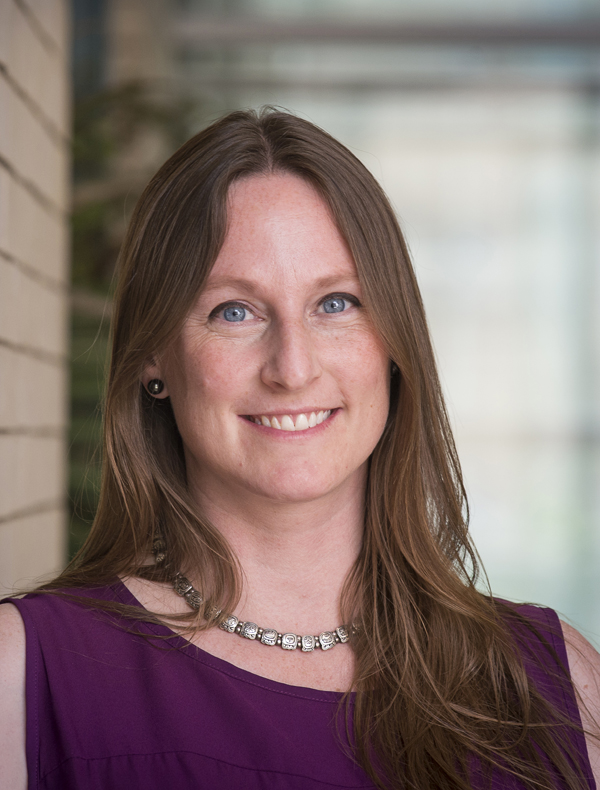METALS Students See Their Future in Alumni Mentors
By Caroline Sheedy
Media Inquiries- University Communications and Marketing
- 512-705-1228
High-quality, personalized feedback for students is one of the hallmarks of Carnegie Mellon University's learning engineering approach. Learning engineers integrate such feedback into everything from course design to learning technology. In a difficult class, it can be crucial to students' success during the semester and even impact the course of their career. Now, CMU is making sure that high-quality, personalized feedback is possible in larger classes.
Lauren Herckis, special faculty for the Simon Initiative with a courtesy appointment in the Human-Computer Interaction Institute, is leading the way. Herckis is adding a team of alumni mentors into her Educational Goals Instruction and Assessment (EGIA) class this fall. The class, a core course in CMU's Masters of Educational Technology and Applied Learning Science (METALS) program, is notoriously challenging.
An expert in faculty culture and learning engineering, Herckis said adding alumni mentors will give students a big advantage. Not only will students receive individualized feedback; the mentors also show a glimpse of what's to come in their future.
"The alumni mentors provide extremely valuable guidance to the students while they are taking the class. On another level, they allow students to see themselves as experts in the field," Herckis said. "These alumni are a living embodiment of a light at the end of the tunnel."
A team of 10 mentors in various career stages all over the world are part of Herckis' course team. Each alum will mentor several teams of students and have access to a coordinator who is working with all alumni mentors, ensuring that mentors can support each other and talk about the common challenges across the groups.
When Sam Weaver took EGIA, there were only five METALS students in her class. A 2018 graduate of the program, Weaver is now an instructional designer at EY, where she creates learning and development programs for professionals. She said the way EGIA is set up now, with students forming project teams, is extremely applicable to the professional world.
"At an organization you are not going to be working individually. Coming together as a team to use instructional design principles to form how you approach learning is very important," Weaver said.
As an alumni mentor, Weaver will help students contextualize what they are learning in class.
"I think that alumni can make things more concrete for students, and, importantly, listen," Weaver said. "The thing I am most excited for is listening to them and repeating back to them what I'm hearing. Sometimes you just need a sounding board and validation that you're on the right track."
Michael Bett, the managing director of METALS, frequently works with alumni like Weaver. He saw alumni mentors successfully used in METALS capstone course, and thinks there are benefits for the mentors, too.
"It's a great opportunity for alumni to refresh their knowledge and even to get experience with things that have changed since they took the class. They'll get to be actively involved in seeing the latest research," Bett said.
"These alumni are a living embodiment of a light at the end of the tunnel." — Lauren Herckis
Herckis said that alumni mentors also can help level the power differential between students and their professor.
"Many students are much more comfortable talking to teaching assistants, fellow students or alumni than they are approaching an instructor. It takes a lot of relationship building to enable or facilitate those kinds of conversations and to really help students find the heart of their challenges. It can be much easier for someone who doesn't have that power differential to contend with."
She also recognized the advantages of teaching the class as a hybrid experience, with some students attending in person and some remotely.
"Making it hybrid really opened the possibilities for collaboration, especially with being able to use mentors who are not in Pittsburgh," Herckis said. "The course is a wonderful opportunity for a diverse group of students and mentors who are all passionate about changing the nature of education, so it's exciting to see how the semester plays out.
To prepare the mentors to join the course team, Herckis worked with CMU's Eberly Center. There, a team assembled asynchronous training materials, including Open Learning Initiative courses on collaboration, conflict resolution and providing feedback. Later, mentors will participate in a training session and work with Eberly Center facilitators to review case studies on what they might encounter as mentors.
